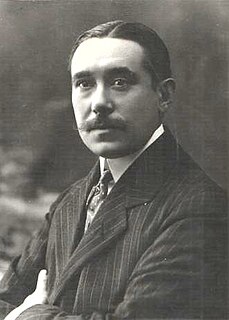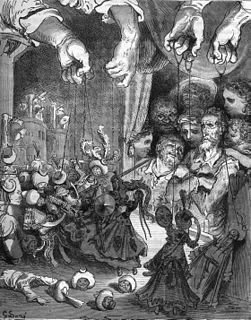
Joaquín Turina Pérez was a Spanish composer of classical music.

El retablo de maese Pedro is a puppet-opera in one act with a prologue and epilogue, composed by Manuel de Falla to a Spanish libretto based on an episode from Don Quixote by Miguel de Cervantes. The libretto is an abbreviation of chapter 26 of the second part of Don Quixote, with some lines added from other parts of the work. Falla composed this opera "in devoted homage to the glory of Miguel de Cervantes" and dedicated it to the Princess de Polignac, who commissioned the work. Because of its brief length by operatic standards, its very challenging part for a boy opera performer, and its use of puppets, it is not part of the standard operatic repertoire.
Cante jondo is a vocal style in flamenco, an unspoiled form of Andalusian folk music. The name means "deep song" in Spanish, with hondo ("deep") spelled with J as a form of eye dialect, because traditional Andalusian pronunciation has retained an aspirated H lost in other forms of Spanish.
L'Atlàntida is an 1877 poem in Catalan by Jacint Verdaguer. It consists of an introduction, ten books, and a conclusion, dealing with the wanderings of Heracles in the Iberian Peninsula, the sinking of the continent of Atlantis, the creation of the Mediterranean Sea, and the discovery of the Americas. This poem was written by Verdaguer in honour of shipping magnate Antonio López y López, first Marquis of Comillas.

El sombrero de tres picos is a ballet choreographed by Léonide Massine to music by Manuel de Falla. It was commissioned by Sergei Diaghilev and premiered in 1919. It is not only a ballet with Spanish setting but one that also employs the techniques of Spanish dance instead of classical ballet.
Nights in the Gardens of Spain, G. 49, is a piece of music by the Spanish composer Manuel de Falla. Falla was Andalusian and the work refers to the Hispano-Arabic past of this region (Al-Andalus).
John Brande Trend, or J.B. Trend (1887–1958), was a British Hispanist and the first Professor of Spanish at the University of Cambridge.

El Concurso del Cante Jondo was a well-known celebration of the art of flamenco, its music, song, and dance, held in Granada, Spain, on Corpus Christi, the 13th and 14 June 1922. At conception the idea of composer Manuel de Falla, its organizating activities enjoyed early and strong support from poet Federico García Lorca. The two outdoor, evening events included amateur flamenco performers, as well as revered professionals.
The City of Granada Orquestra is a Spanish orchestra based in Granada, Spain. Its primary concert venue is the Auditorio Manuel de Falla.

Los amores de la Inés is a zarzuela in one act, two scenes, composed by Manuel de Falla in collaboration with Amadeu Vives. The work uses a Spanish language libretto by Emilio Dugi and the music is organized into a prelude and five musical sections.

Danza ritual del fuego is a movement of the ballet El amor brujo, written by the Spanish composer Manuel de Falla in 1915. It was made popular by the composer's own piano arrangement. The dance has a duration of about three to four and a half minutes.

Paco de Lucía interpreta a Manuel de Falla is the twelfth studio album by the Spanish composer and guitarist Paco de Lucía. All the pieces were written by Manuel de Falla.
Concerto for Harpsichord, Flute, Oboe, Clarinet, Violin and Cello is a chamber concerto written for harpsichord and chamber ensemble by the Spanish composer Manuel de Falla in 1923–26. It was written for and premiered by Wanda Landowska, to whom the score is dedicated.

Atlántida (Atlantis) is an opera in a prologue and three parts, by Manuel de Falla, based on the Catalan poem L'Atlàntida by Jacint Verdaguer. Falla worked on the score for twenty years but had not completed it at his death in Argentina in 1946; his disciple Ernesto Halffter prepared the score for performance.
Siete canciones populares españolas is a 1914 set of traditional Spanish songs arranged for soprano and piano by the composer Manuel de Falla. Besides being Falla's most-arranged composition and one of his most popular, it is one of the most frequently performed sets of Spanish-language art songs. The set was dedicated to Madame Ida Godebska.
José Tragó y Arana was a Spanish pianist and composer.
Antonio Gallego Gallego is a Spanish writer and musicologist.

Helio Fallas Venegas is a Costa Rica economist and politician. From 2014 to 2018 he served as the Vice-President of the country, along with Ana Helena Chacón Echeverría. Fallas' main economic interest is national public policy. He generally opposes free trade and supports public social programs. Fallas has served in three separate presidential administrations.










